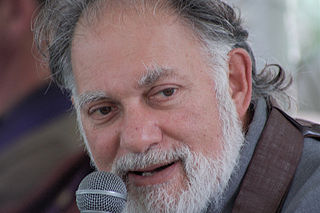A Quote by Jeffrey Tayler
A purpose derived from a false premise - that a deity has ordained submission to his will - cannot merit respect. The pursuit of Enlightenment-era goals - solving our world's problems through rational discourse, rather than through religion and tradition - provides ample grounds for a purposive existence. It is not for nothing that the Enlightenment, when atheism truly began to take hold, was also known as the Age of Reason.
Quote Topics
Age
Age Of Reason
Also
Ample
Atheism
Began
Cannot
Deity
Derived
Discourse
Enlightenment
Era
Existence
False
Goals
Grounds
His
Hold
Known
Merit
Nothing
Ordained
Our
Our World
Premise
Problems
Provides
Purpose
Pursuit
Rather
Rational
Reason
Religion
Respect
Solving
Submission
Take
Than
Through
Tradition
Truly
Will
World
Related Quotes
In Europe, the Enlightenment of the 18th century was seen as a battle against the desire of the Church to limit intellectual freedom, a battle against the Inquisition, a battle against religious censorship. And the victory of the Enlightenment in Europe was seen as pushing religion away from the center of power. In America, at the same time, the Enlightenment meant coming to a country where people were not going to persecute you by reason of your religion. So it meant a liberation into religion. In Europe, it was liberation out of religion.
Whether or not enlightenment is a plausible goal for us is a vital question for our lives. If it is possible for us to attain such perfect enlightenment ourselves, our whole sense of meaning and our place in the universe immediately changes. To be open to the possibility is to be a spiritual seeker, no matter what our religion. Enlightenment is not meant to be an object of religious faith. It is an evolutionary goal.
Enlightenment is finding that there is nothing to find. Enlightenment is to come to know that there is nowhere to go. Enlightenment is the understanding that this is all, that this is perfect, that this is it. Enlightenment is not an achievement, it is an understanding that there is nothing to achieve, nowhere to go. You are already there - you have never been away. You cannot be away from there. God has never been missed. Maybe you have forgotten, that's all. Maybe you have fallen asleep, that's all.
We cannot ultimately specify the grounds (either metaphysical or logical or empirical) upon which we hold that our knowledge is true. Being committed to such grounds, dwelling in them, we are projecting ourselves to what we believe to be true from or through these grounds. We cannot therefore see what they are. We cannot look at them because we are looking with them.
The rationale for accepting or rejecting any theory is thus fundamentally based on the idea of problem-solving progress. If one research tradition has solved more important problems than its rivals, then accepting that tradition is rational precisely to the degree that we are aiming to "progress," i.e., to maximize the scope f solved problems. In other words, the choice of one tradition over its rivals is a progressive (and thus a rational) choice precisely to the extent that the chosen tradition is a better problem solver than its rivals.
The happiness we seek cannot be found through grasping, trying to hold on to things. It cannot be found through getting serious and uptight about wanting things to go in the direction we think will bring happiness. We are always taking hold of the wrong end of the stick. The point is that the happiness we seek is already here and it will be found through relaxation and letting go rather than through struggle.
There was this famous clash of civilization thesis from Samuel Huntington, a political theorist. And the idea was that Western civilization is at war with Islam and maybe some of the other civilizations around the world. And I don't agree with that. But I do think there is such a thing as Western civilization. I think it starts with the Greeks and the Romans. Then it goes through the Enlightenment - or the Reformation, the Enlightenment. It goes through the scientific age. And it somewhat defines some of the cultures and mores of Europe and North America and some other countries.

































